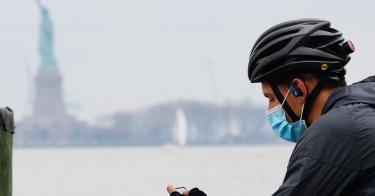The coronavirus pandemic has brought out the best in some people. Unfortunately, it also has brought out the very worst in others.
For reasons that decent folks probably never will understand, some bad actors have threatened to spread COVID-19 intentionally by coughing on people and produce in grocery stores and elsewhere.
A man in New Jersey told a store clerk that he had the coronavirus and coughed on her. A man in Missouri wrote “COVID” on a cooler door and then intentionally coughed on shoppers. And a woman in Pennsylvania coughed and spit on produce at a grocery store, forcing it to throw out $35,000 worth of food.
Despicable acts for sure, but are they acts of terror akin to bombing buildings or mailing anthrax? According to the Department of Justice, they could be.
A recent Justice Department memo encourages federal prosecutors to consider charging anyone who threatens to expose or infect others with the coronavirus intentionally, under several anti-terrorism statutes that make it illegal to possess or use a “biological agent” as a weapon.
The law defines “biological agent” as “any microorganism” capable of causing, among other ills, “death, disease, or other biological malfunction in a human.”
The new coronavirus falls within that broad definition, but charging those in the examples above as terrorists under federal law is unwise and unnecessary, especially since a bunch of state criminal laws already cover such conduct. It also would contribute to the growing and troubling trend of federalizing crimes that states traditionally have been charged with prosecuting.
Don’t get us wrong. What these people are accused of doing is despicable, and if they did it they deserve to be in jail.
But spending federal resources to expand the anti-terrorism statutes in this way is not a good solution.
For one thing, this is a novel expansion of these terrorism statutes. No case that we could find applied these statutes to conduct such as intentionally coughing on people and produce.
Previous prosecutions targeted crimes such as sending ricin in the mail and planning to turn Bic lighters into dart guns to deliver botulism, rabies, or anthrax to large numbers of people.
What prior cases had in common—and what is missing from grocery store coughing cases—is the weaponization of a disease or toxin to target groups systematically for political purposes.
The Supreme Court’s opinion in Bond v. United States (2013) provides a useful comparison. The government sought to prosecute a woman under a similar statute that broadly defined and prohibited the use of “chemical weapons.” The government argued that the woman had spread a homemade chemical concoction on a romantic rival’s doorknob, and it burned her thumb.
Although the chemical concoction fell within the broad definition of “chemical weapon,” the high court overturned the defendant’s conviction because the federal statute was meant to prevent war crimes and terrorism, not “common law assault.” Missing from the statute was “a clear statement that Congress meant the statute to reach local criminal conduct.”
Such a clear statement also is missing from the anti-terrorism statutes here. If law enforcement can reshape criminal statutes so easily to apply to this conduct, nobody can know what the law expects of them.
To expand the law to reach conduct previously outside its reach is unwise, not only because of the increased uncertainty but also because it upsets the traditional balance of power between the states and the federal government.
Federal terrorism statutes are designed, in part, to allow the federal government to deter and prosecute crimes that are not easily prosecuted by the states, either because of the resources involved or the cross-jurisdictional challenges presented. That’s not the case here. State laws are more than adequate to deal with this sort of localized conduct.
Coughing on people with the intent to scare them into thinking they will be infected is a common-law assault. Many states also have “terroristic threat” laws that make it a crime to threaten to harm someone for the purpose of causing terror.
These laws are perfectly adequate to deal with lone actors who intentionally cough on others, and in fact have been deployed in many such cases.
Federal anti-terrorism resources are much better spent elsewhere. For example, the FBI has identified threats by white supremacist groups to spread coronavirus among police and Jews. And one Democratic politician in Colorado, Candi CdeBaca, promoted the idea of spreading coronavirus at President Donald Trump’s rallies.
These would be true acts of terrorism: weaponization of COVID-19 to target groups systemically for political purposes. And the full weight of federal law enforcement should be brought to bear against those acts, because a single state may not be able to adequately prevent and punish such efforts.
But when it comes to lone bad actors coughing in a grocery store, prosecutions under federal anti-terrorism laws would be excessive. They deserve to be prosecuted, but state laws and local law enforcement already have the tools to deal with them.
Federal law enforcement should spend their limited time and resources on true terrorism. And we hope that federal prosecutors will interpret the deputy attorney general’s memo in that light.
This piece originally appeared in The Daily Signal




